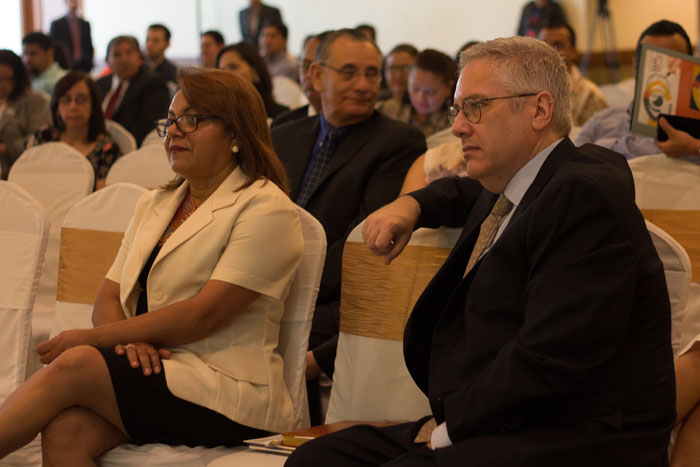Crime, violence and corruption have long been impediments to creating safe communities and improving livelihoods in Honduras. In 2011, the small Central American nation had one of the highest murder rates in the world. These challenges have become a roadblock to a better future for citizens and particularly youth. It was in this environment that Counterpart’s Impactos program began.
Dina Eguigure, a Honduran citizen, began working with Impactos as a Youth Specialist in 2011. Five years later, as the program comes to an end, she serves as its Chief of Party. We spoke with Dina about the accomplishments of Impactos, her experience with Counterpart, and her thoughts on the future of security and accountability issues in Honduras.

Dina Eguigure, (L), sits next to Counterpart’s Chief Operating Officer, Derek Hodkey at the launch of Impactos II in Tegucigalpa
What has it been like to work for Counterpart in Honduras these last five years?
Wow. Counterpart has given me a lot of opportunities through the various position I’ve held. I feel like the opportunity to learn is the most important thing they have given me. I also am fortunate to have been able to lead a team that was eager to learn and willing to take risks so we could effectively confront tough issues like security, transparency and accountability. No one person has all of the information or experience needed to really make a change. It takes a team. Each of the positions that I have held came with a commitment to the team and to the work. And now, as our funding comes to an end, our team will continue working together until the very last day.
What was the purpose of Programa Impactos?
Programa Impactos had two goals: preventing violence in Honduran communities while also increasing accountability and transparency in the government of Honduras. The violence prevention part of the program was composed of workshops, trainings, events and other direct activities with communities and their local governments. Community proposals were generated quickly and concrete action taken immediately. We could see the impact much faster. On the other hand, working to promote transparency and accountability to reduce corruption takes much more time.
What was needed to address these kind of challenges in Honduras?
Impactos had to establish relationships with civil society organizations and gain their trust and respect. We’ve worked with more than 8,000 representatives from across Honduras civil society. And now, because of the relationships we have built, we have truly gained the respect of civil society organizations and local governments.
This respect has enabled us to work together to both prevent violence and promote transparency and accountability. And once we had that respect, we began working very quickly, we were busy! Over the last five years, Impactos and Counterpart have become well-known and respected in Honduras, especially with people who work to create safer communities. And now, everyone is asking, will there be another Impactos? Impactos II or Impactos III?
How has Impactos made a difference in Honduras?
First, we established ourselves as an inclusive project that works with organizations and representatives from across the political spectrum to advance social good. We wanted safer streets and more effective governance, so we reached across the aisle. This is something that no other project has accomplished. Following this, we established an open and collaborative dialogue between the government and civil society to propose better public policies focused on public safety and promoting transparency and accountability in Honduras. As I said in a forum we had in Washington DC with three of our partners from Honduras, the Impactos program and our partners are committed to working together to strengthen public institutions’ ability to respond to the needs of citizens.
What kind of progress do you want to see continue in Honduras?
Well, the outlook is not completely positive. We have a very centralized government that doesn’t necessarily cooperate with civil society as much as it could. In that respect, I think we need to create more space for civil society by increasing access to information. Access to information is hard here. The Secrecy Law makes it very challenging to understand what is actually happening with our government.
And that is why I think the international community can play an important role in influencing both our government and civil society to work together with one another. This will enhance the livelihoods of Hondurans tremendously. Because the worst thing that could happen is that the government centralizes further rather than encourages more civic participation. That is why organizations like Counterpart are so important. Counterpart has helped us empower organizations, individuals and networks to speak up and be agents of change for social good. We now have powerful allies in both the public and private sectors working toward social inclusion and civil society empowerment. That’s a big impact of the program. And I trust that the alliances will continue after the program officially ends.
I want to thank Counterpart for all the tremendous opportunities they have given me, and also thank them for working to catalyze change agents all across Honduras.


